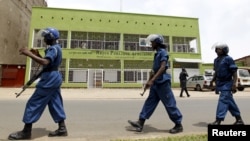Burundi's government will be invited to talks in Brussels to seek a solution to a political crisis in the Central African country that has killed more than 120 people, EU diplomats say, warning of a suspension of aid if talks fail.
EU foreign policy chief Federica Mogherini will send a letter to President Pierre Nkurunziza early next week, setting in motion a 150-day consultation process that the European Union hopes will end the country's worst crisis since a civil war ended in 2005.
"The consultations will provide an opportunity for Burundi to present the government's program, particularly as regards democratic principles, human rights and governance," according to a draft copy of a letter to be sent by Mogherini next week.
The European Union says more than 120 people have died and 190,000 people have been forced to flee Burundi since April, when Nkurunziza announced plans to seek a third term in office.
Nkurunziza secured the new term in July elections, which the opposition boycotted saying it broke terms of the 2005 peace deal that set two-term limits for presidents.
Burundi is a nation with a similar ethnic mix to neighboring Rwanda, were 800,000 people died in a genocide in 1994.
The talks, which must start 30 days after Burundi receives the letter, are the next step in the European Union's diplomatic efforts to stabilize the fragile situation.
The EU this month imposed asset freezes and travel bans on four officials close to Nkurunziza who are accused of using excessive force during clashes in the run-up to his re-election.
Separately, former colonial power Belgium has halted some aid to the government, a step that EU diplomats say the European Union is willing to take if talks do not bring a solution.
Still, countries are wary of harming the population, as the 28-nation EU provides about half of Burundi's annual budget.
"This is a last resort," said one EU diplomat. Belgian aid for Burundi was just under 50 million euros ($56 million) in 2013, most of it going directly to the state.





